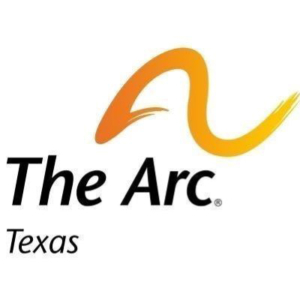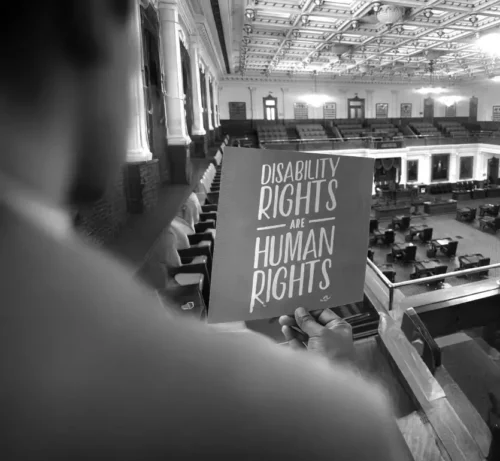Texans with IDD and mental health issues repeatedly failed by state, report finds
Media Contact:
Alex Stuckey
Investigative Reporter, The Arc of Texas Whole Person Project
alexdstuckey@gmail.com
937-999-7149
Jenni Johns turned her home into a makeshift psychiatric ward after her son was denied admission to private mental hospitals all over Texas.
Melinda Tolentino was separated from her family for seven months, helping an ailing parent in another state while her husband stayed in Texas searching for care for their daughter, who’d been on a waitlist for a Medicaid waiver for over a decade.
Shantel Taylor watched in anguish as her son, Kai’Yere Campbell, sat in a jail cell covered in sores for months, waiting—along with 2,000 others—for a state psychiatric bed.
Hundreds of thousands of Texans with intellectual and developmental disabilities (IDD)—such as autism, down syndrome, and attention-deficit/hyperactivity disorder—also experience mental illness. But the state is ill-equipped to help them, leaving families like the Johns, Tolentinos, and Taylors with nowhere to turn, a report released December 5, 2024 by The Arc of Texas found.
The Arc of Texas spoke to these and nearly a dozen other families with the help of Pulitzer Prize-winning investigative reporter Alex Stuckey, examining the areas in which the state’s mental health resources for adults with IDD are lacking and how they can be improved.
The report is part of the five-year-long Whole Person Project, an initiative of The Arc of Texas funded by Texas Council for Developmental Disabilities* that aims to improve access to quality mental health services for adult Texans with IDD.
Key findings of the report include:
- More than 176,000 people are waiting for care through Medicaid waiver programs—which aim to keep individuals with IDD living in their communities—a 73 percent increase since 2015. Some people wait nearly 20 years to reach the top of the list.
- Personal care attendants—who help disabled individuals with everyday tasks such as bathing, dressing, and toileting—make an average of $10.60/hour in Texas. This ranks the state 50th out of the 50 states and Washington, D.C., in average hourly wage. Louisiana is the only state with lower pay.
- About 8.6 million Texans have no alternatives to restoring their competency beyond sitting in a jail cell waiting for a state psychiatric bed—a wait that can stretch on for months.
- Texans in at least 62 of the state’s 254 counties have access to jail diversion centers, which connect individuals with IDD and/or mental illness with care instead of sending them to jail.
- Nearly 2,000 people are waiting for a bed in a state-funded psychiatric hospital—most of them from a jail cell—a 500 percent increase since 2015.
- Texas does not require training for county jailers on how to handle individuals with IDD.
- At least ten privately funded psychiatric hospitals in Texas have an IQ cutoff of around 70, meaning individuals with IDD are often barred from entrance.
- Only two of the 18 Texas colleges and universities with Masters and/or Doctoral Psychology programs with a clinical component surveyed by The Arc of Texas offer IDD training beyond assessment and diagnostic services.
These findings and potential solutions recommended by The Arc of Texas are included in our 37-page report here. Families interviewed by The Arc of Texas and datasets compiled by Stuckey are available upon request, as are photos of individuals mentioned. For a quick summary of recommendations click here.
“About one-third of the estimated 500,000+ Texans with IDD also have a mental health diagnosis. The inequities they endure in Texas’ mental health care system are staggering yet solvable. We hope this report shines a light on ways we can make progress together—a roadmap of recommendations for our state’s elected officials, resources for mental health practitioners seeking guidance, and information for IDD advocates to help us carry this initiative forward,” said Jennifer Martinez, CEO of The Arc of Texas.
Personal stories:
- 2-minute video: Learn about three Texas families who have an adult child with co-occurring IDD and mental disorders, how they’ve been failed by state systems ill-equipped to handle the dual diagnoses, and get a quick overview of The Whole Person Project.
- 3-minute video: Michelle Dooley describes the continuing search for care for her 39-year-old son Morgan, who has Landau-Kleffner syndrome, a Fifth Chromosome disorder, and Bipolar disorder. Morgan’s six-month stint in a state hospital left him worse off than before, adding Post-Traumatic syndrome to the symptoms his psychiatrist tries to help manage, but she admits, “I haven’t been trained to work with people like this.” Michelle says despite the continued search for appropriate care, “[Morgan] is a tribute community can work if we could just get the money out there.”
###
About The Arc of Texas
The Arc of Texas is a statewide advocacy organization that promotes, protects, and advocates for the human rights and self-determination of Texans with intellectual and developmental disabilities (IDD). We envision a world where Texans with intellectual and developmental disabilities are included in their communities with quality support and services that meet their needs and choices. The Arc of Texas focuses on four policy pillars impacting Texans with IDD: 1) quality of life (community supports and services), 2) inclusive education, 3) integrated employment, and 4) civil rights and justice.
Alex Stuckey is a Pulitzer Prize and Livingston Award-winning investigative reporter who has spent the better part of a decade reporting on mental health and disability issues in Texas.
*This work is supported by the Texas Council for Developmental Disabilities through a grant from the U.S. Administration for Community Living (ACL), Department of Health and Human Services (HHS), Washington, D.C. 20201, with a 100% federal funding award totaling $6,121,860. Council efforts are those of the grantee and do not necessarily represent the official views of nor are endorsed by ACL, HHS, or the U.S. government.






